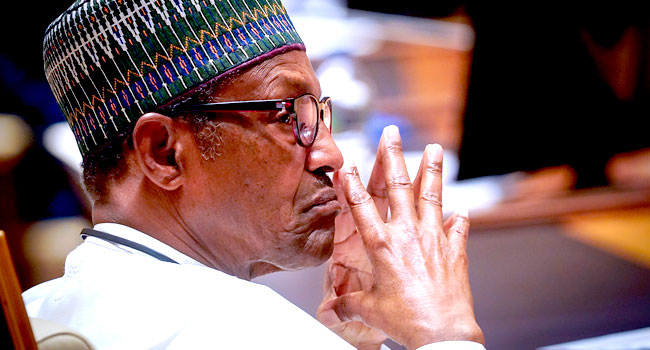The Constitution of the Federal Republic of Nigeria (1999 as amended) in its S.143 gives the National Assembly sweeping powers and lays the procedure for the removal of a president from office. To not bore you with details, let’s isolate S.143(11) to illustrate the latitude the NASS has on this matter.

It goes: “in this section- “gross misconduct” a grace violation or breach of the provisions of this constitution or a misconduct of such nature as amounts in the opinion of the national assembly to gross misconduct.” This provision means that the national assembly is at liberty to remove the president for whatever reason as long as it musters the required number!

It gets even more interesting when the constitution ousted the powers of the courts to intervene in this process in the preceding subsection. It read, “No proceedings or determination of the panel or the National Assembly or any matter relating thereto shall be entertained or questioned in any court.” The NASS is, therefore, an authority unto itself whenever it determines to remove a president.
The questions, however, are whether this barking NASS is ready to bite and to what effect is this attempt to impeach the president? And then, is this the best way to achieve whatever the legislature intends to achieve with this impeachment or threat of it?
What we hear from some of the legislators, who have ventilated on this matter, is that the ultimatum given to the president to shape up or ship out borders on the growing level of insecurity in the country. However, why did the legislators wait until this moment, when the regime of the President, Major General Muhammadu Buhari (retd.), has spent more than 75% of its tenure but has yet to bare its fangs?
The Constitution of the Federal Republic of Nigeria (1999 as amended) in its S.143 gives the National Assembly sweeping powers and lays the procedure for the removal of a president from office. To not bore you with details, let’s isolate S.143(11) to illustrate the latitude the NASS has on this matter.
It goes: “in this section- “gross misconduct” a grace violation or breach of the provisions of this constitution or a misconduct of such nature as amounts in the opinion of the national assembly to gross misconduct.” This provision means that the national assembly is at liberty to remove the president for whatever reason as long as it musters the required number!
It gets even more interesting when the constitution ousted the powers of the courts to intervene in this process in the preceding subsection. It read, “No proceedings or determination of the panel or the National Assembly or any matter relating thereto shall be entertained or questioned in any court.” The NASS is, therefore, an authority unto itself whenever it determines to remove a president.
The questions, however, are whether this barking NASS is ready to bite and to what effect is this attempt to impeach the president? And then, is this the best way to achieve whatever the legislature intends to achieve with this impeachment or threat of it?
What we hear from some of the legislators, who have ventilated on this matter, is that the ultimatum given to the president to shape up or ship out borders on the growing level of insecurity in the country. However, why did the legislators wait until this moment, when the regime of the President, Major General Muhammadu Buhari (retd.), has spent more than 75% of its tenure but has yet to bare its fangs?
This is not the only area the NASS could have saved Nigeria some trouble were it more responsible. From the mismanagement of the economy to the incredible levels and volume of corruption, from the issue of oil theft to the quantum of lopsided appointments, which has drawn endless criticism from Nigerians, to the mishandling of the country’s diversity, which is unfortunately one of the reasons for the level of insecurity in the polity, this NASS could have done much more to save Nigeria some of its current travails. But it is clear that a legislature, whose proceedings are witnessed by (maybe) just a quarter or less of its membership save during the election of their leaders, budget presentations, confirmation of ministers or some other ceremonies, cannot recommend itself to much seriousness. That is in spite of the enormous resources that the nation commits to this institution.
All said though, it is doubtful that this national assembly, where no ideological or political differences matter, surprised anyone with this hypocritical and call it made last week. Did anyone really expect much difference?
In a December 2019 piece entitled, Why Nigeria does not need a rubber stamp legislature, published on this page, I had written: “The 9th National Assembly has indicated on more than one occasion that it would do the bidding of the current administration. Senate President Ahmed Lawan, in fact, once went as far as promising that any request from Buhari was sure to make Nigeria a better place and would as a result, be treated expeditiously. This assumption suggests that there may be no rigorous examinations of executive proposals, it overlooks the fallibility of all men, surrenders the rights of the people for expediency and generally exposes Nigeria’s nascent democracy to grave danger. Is this how to deepen a democracy?” Three years on, we have seen through them.
If anything, the national assembly is complicit in the disappointment that this government is. If it is serious about an impeachment at all, it could only have been motivated by personal interests as is all attempted and actual impeachments in Nigeria’s history. If it is for the love of country, these people should sit with the executive and find how to make the best use of the next couple of months to avoid the looming submergence of Nigeria.
Niran Adedokun
Twitter: @niranadedokun




















